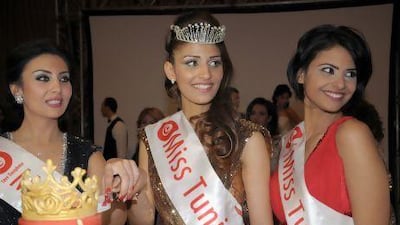TUNIS // Resplendent in glimmering pink pearls and standing in a cloud of perfume, Leila Oualha, who was Miss Tunisia in 2000, is all poise and serenity as she prepares to judge this year's competition.
But even this elegant marquee outside a fancy hotel, where the contenders preen backstage and guests shimmer up to the door, is not far away from the complicated dynamics of the unsettled country.
"Here in Tunisia, you will find different kinds of people," says Leila. "You will find conservative people - especially now with this so-called Arab Spring - and you will find people who are very, very open to the world. And those people are sometimes in conflict."
This year's winner, she says, should open up minds, particularly in conservative, rural areas. "The most important role is to go to people and communicate the right image. If Miss Tunisia goes to the regions, to people - I think they will be more open."
From the band leader to the judges, the stout ladies pinning the slender beauty queens into designer gowns to the fashion journalists, everyone on Saturday night says there is a need to project a picture of what today's Tunisia should be like.
"Such events are a very important demonstration for a little country like ours," says Amina Srarfi, the leader of Al Azifet, an all-female band. "The world must know that Tunisia has its place in the artistic world, the fashion world, the economic world."
Her band plays mostly traditional Tunisian music, clad in billowing gold trousers and green waistcoats like figures from folklore. But Amina insists that the pageant shows the world that Tunisia is modern. "This event can show that even with the problems we suffer, it's moving forward for the woman … who works hand in hand with the man."
This is the first time the pageant has been held since the uprising in 2011 that overthrew the president and ushered in democracy, in which an Islamist party, Ennahda, has become prominent. Last year, there was still too much uncertainty to hold the show, says the organiser Aida Antar.
But now, although the country is still in the thick of a debate about Islamism versus secularism, many people's lives are back to normal. The contest is back, albeit without the swimsuit round that had been a staple since it began in the 1950s.
"I believe in a new Tunisia, where fashion has a place," says Seyf Dean Laouiti, a Taiwanese-Tunisian designer, whose creations the contestants model. He is wearing blue contact lenses, a ring with a golden stag's head and heraldic scarlet coat against the chill of the tent.
Holding a clinging lace gown, he says that the show is "a way to demonstrate that good manners exist, and it's a way to show how women act in society". But he is really more interested in the dresses, and plunges back into the clothes racks to show more of his masterpieces.
This is scarcely the world's most fashionable capital. It is perfectly acceptable to do grocery shopping in pyjamas, and the few high-end shops are outnumbered by hundreds of thrift or second-hand stores more suited to the modest budgets of most people.
But for a small country, Tunisia has had a say in what the world wears. Azzedine Alaïa, whose skintight, sculptural dresses shaped the 1980s, is Tunisian, as is Max AZRIA who designs the French label BCBG. A few Tunisian models grace catwalks and, as in most countries, there are some young people for whom their appearance is of overwhelming interest.
Backstage, these young women retouch make-up and adjust hair. They wear coloured silk with gold epaulettes and braid, like Sergeant Pepper-era Beatles, and the prevailing worry is that they have not practised the dance routine in the six-inch silver heels they will all wear.
"What if we slip?" says one. But they do not slip, at least not much. Hours later, the show begins and they dance, sing songs and offer ideas about how to improve Tunisia. Their communications coach, Houssem Hammami, says one of his biggest problems is teaching the women from conservative backgrounds to look men in the eye when talking to them.
The eventual winner, Heba Talmoudi, a sports teacher, speaks of a plan for young sporting ambassadors. Her lacquered hair towers and her false eyelashes flutter as she speaks. Over the next few days, she appears in talk shows and in newspapers - a change, at least, from the images of protest and newly donned niqabs more common in news stories about Tunisia.
Heba does not look much like most Tunisian women, many of whom dress more conservatively. But, then, most beauty queens don't look like everyone else. Much more like an average Tunisian woman is Leila Abid, middle-aged, wearing a hijab and long skirt, who laughs as she fits the frocks to the gazellelike figures.
And, as many Tunisians would, she shrugs good-humouredly when asked about the choices women make about how to dress. "Everyone is free," she says. "I'm not against the ones who dress like this. Everyone has their own way of living their life."
afordham@thenational.ae
twitter: For breaking news from the Gulf, the Middle East and around the globe follow The National World. Follow us

